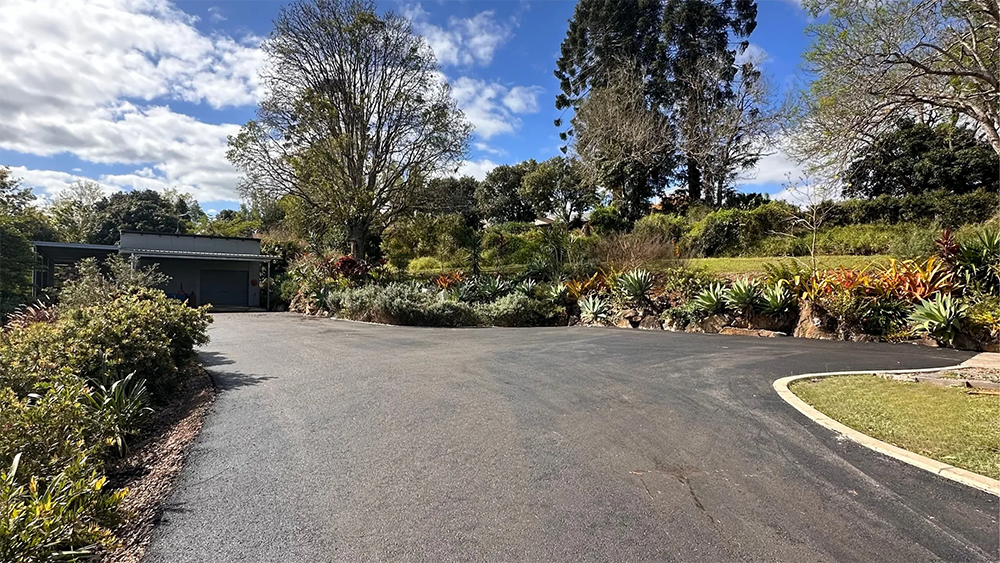How Long Does An Asphalt Driveway Last? What You Need To Know
An asphalt driveway is more than just a practical entry point to your property; it’s an investment in convenience, functionality, and appearance. Naturally, homeowners want to know how long their driveway will last and what they can do to protect that investment. Asphalt has long been a popular choice because it offers durability and value, but like any surface, its lifespan depends on various factors.
For budget-conscious customers and long-term planners, realistic expectations about lifespan, maintenance, and the signs that signal when attention is needed are important. This guide explores the average life of asphalt driveways, what shortens their longevity, and how to make yours last as long as possible.
The Average Lifespan of Asphalt Driveways Explained
An asphalt driveway lasts between 15 and 25 years when properly installed and maintained. This broad range reflects differences in climate, traffic, and care. Unlike concrete, asphalt has flexibility, which allows it to withstand ground movement and seasonal changes better.
Key points that influence lifespan include:
- Quality of base preparation and compaction.
- The amount and type of traffic the driveway handles.
- Local weather conditions, including rainfall and heat.
- Regular upkeep, such as sealing and crack filling.
Understanding these factors helps homeowners plan for the expected life of their asphalt surface.
Factors That Can Shorten Your Driveway’s Life
Even the strongest driveway can wear out early if certain conditions are ignored. By being aware of the risks, homeowners can take action to prevent premature deterioration.
Common causes of reduced lifespan include:
- Poor drainage that allows water to pool and weaken the base.
- Heavy or oversized vehicles that place too much stress on the surface.
- Neglected cracks and holes that expand over time when exposed to water and traffic.
- Lack of sealing, leaving the asphalt vulnerable to sun and chemical damage.
By addressing these issues early, you avoid the need for costly repairs later on.
How Weather Conditions Influence Durability
The Australian climate places unique demands on asphalt. Weather plays a central role in determining whether a driveway reaches its full potential lifespan.
- Heat: High summer temperatures can soften asphalt, leading to rutting under the weight of vehicles.
- Rain: Prolonged rain without adequate drainage can erode the base and destabilise the surface.
- Seasonal changes: Expanding and contracting temperatures cause cracking that worsens with time.
- UV exposure: Constant sunlight fades colour and weakens the surface layer.
Taking steps such as sealing and ensuring good drainage reduces the impact of these natural forces.
The Role of Proper Installation in Longevity
No matter how well you maintain it, an asphalt driveway won’t last long if properly installed. Professional installation provides the foundation for long-term durability.
Base Preparation
A driveway’s strength begins with the base. Without a compacted, stable foundation, the asphalt will shift and crack.
Correct Grading
Grading ensures water flows away from the surface rather than pooling and causing erosion.
Layer Thickness
Applying the correct thickness of asphalt is crucial. Too thin, and it wears out quickly; too thick and its flexibility is reduced, leading to cracking.
Professional Equipment
Specialised machinery ensures the asphalt is compacted properly and consistently across the surface.
Getting these steps right at the beginning prevents most of the problems that reduce a driveway’s lifespan.
Maintenance Practices That Extend Asphalt Life
Routine care adds years to your driveway and delays the need for costly repairs or replacement.
Practical maintenance steps include:
- Sealing: Applying a sealcoat every three to five years protects against water, UV rays, and surface wear.
- Crack filling: Addressing small cracks immediately prevents them from spreading and damaging the base.
- Cleaning: Removing oil, fuel, and chemical spills reduces surface degradation.
- Clearing debris: Leaves, dirt, and grass can trap moisture, contributing to weakening.
- Vehicle restrictions: Avoid parking heavy machinery or oversized trucks on the surface where possible.
With consistent care, many asphalt driveways can exceed the 20-year mark.
Signs Your Asphalt Driveway Needs Attention
A driveway won’t last forever, but spotting the early signs of damage allows for timely intervention before replacement becomes unavoidable.
Indicators include:
- Alligator cracking: Patterns resembling reptile skin that suggest structural issues.
- Potholes: Caused by water infiltration and repeated vehicle stress.
- Fading: UV exposure breaks down the asphalt binder, leaving a grey, brittle surface.
- Surface depressions: Indentations from heavy vehicles or poor sub-base stability.
- Drainage problems: Pools of water that take too long to disperse after rain.
Each of these signs points to the need for either repair or preventative maintenance.
Repair vs Replacement: What’s the Better Choice?
When damage becomes noticeable, the decision is whether to repair or replace. The choice depends on the severity of the issue and the age of the driveway.
Repair Options
- Crack filling and patching: Suitable for minor damage and extends life by preventing water infiltration.
- Resurfacing: Laying a new asphalt layer over the existing one restores appearance and adds another 8–15 years of life.
Replacement
- Required when damage is widespread or the base has failed.
- Offers the longest-term solution, providing a fresh surface that can last 15–25 years with proper maintenance.
Understanding when repairs are no longer cost-effective helps homeowners plan for the future.
Planning for Long-Term Value with Asphalt Driveways
For long-term planners, asphalt driveways provide excellent value when combined with proactive maintenance.
| Approach | Lifespan Gain | Best Use Case |
|---|---|---|
| Regular sealing | +3–5 years | Protecting against sun and water damage |
| Crack filling | Prevents spread | Early-stage deterioration |
| Resurfacing | 8–15 years | Mid-life driveways |
| Full replacement | 15–25 years | Driveways at the end of life |
Thinking in terms of life cycles allows you to budget more effectively and get the most from your investment.
Transform Your Home with Asphalt Driveways Near You
At
Roll Formed Driveways, we provide
asphalt driveways in Brisbane, offering professional installation and maintenance services to help homeowners achieve long-lasting results. Whether you’re replacing an ageing driveway or planning for the future, our team provides practical solutions tailored to your needs.
Get in touch via our contact page or
give us a call to discuss your project and arrange a consultation.








